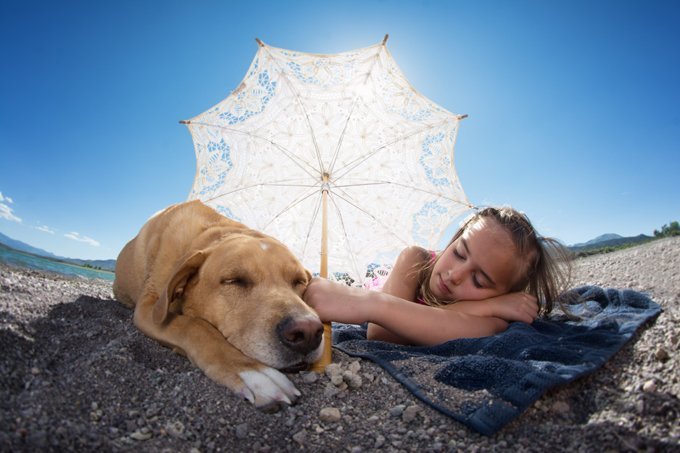Whether you see summer as a time to have fun in the sun or take a nap in the shade, it’s important to keep the health and safety of your dog in mind. The warmest months of summer can be a dangerous time for you dog. Here are some tips to help you make sure your dog enjoys the summer as much as you do.
On The Go With Fido
- Make sure your dog has access to plenty of cool, fresh water 24 hours a day. There are many inexpensive and collapsible bowls (usually plastic or fabric) that you can take with you anywhere and refill at water fountains. If you are going to be out for a long period of time, freeze a bottle of water or bring ice cubes in a Tupperware container so that you will have cold water when you reach your destination.
- Be aware that asphalt and sand can quickly get hot enough to burn the pads of dogs’ paws, and that your dog’s entire body is much closer to the ground than yours. In hot weather, walk your dog on the grass or dirt where it is cooler.
- Never leave your dog in a vehicle. When it’s only 80 degrees outside, a car can heat up to over 120 degrees in just minutes and leaving a window cracked does little to prevent heat build-up. Many vets say that this is the most common cause of heat exhaustion.
- Tying a dog outside a store while you run an errand in never a good idea, but is especially dangerous in the summer since he may be exposed to direct sunlight. If you can’t bring your dog inside the store, it’s best to leave him home.
- Avoid strenuous exercise on extremely hot days. Take walks in the early mornings or evenings, when heat and humidity are less intense. Remember that if your dog is spending most of her time in air conditioning, the intense weather outdoors will be even harder for her to acclimate to.
- Many dogs like swimming, but some cannot swim (Bulldogs, for instance, are too large-boned) or may not like the water. Be conscious of your dog’s preferences and skills before putting him in the water. Always supervise your pet while swimming. Dogs can become easily disoriented in swimming pools and may not be able to find the stairs.
- Chlorine from pools and bacteria from streams, lakes, and ponds can be toxic for a dog’s system. Always rinse your dog with clean water after swimming and never let her drink water from these sources.
Know The Signs Of Heat Exhaustion
- There are many factors that can make a dog more susceptible to heat exhaustion; physical condition, age, coat type, breed, and the climate it is most acclimated to. Very young and very old dogs are at the most risk. Brachycephalic dogs (those with short muzzles), such as Pugs and Bulldogs, are also at greater risk.
- Symptoms of heat exhaustion or stroke can include excessive panting, disorientation, and obvious paleness or graying to the gums due to a lack of oxygen. A dog’s natural 102-degree body temperature should never exceed 105 degrees.
- If you feel your dog is suffering from heat exhaustion or heat stroke, act immediately by submerging her in cool water (not ice cold) or by placing ice packs on her neck. Once the dog has been stabilized get her to a vet.
Keeping Cool
- If you keep your dogs outside, it’s critical that they have access to shade, and remember that dark-colored dogs absorb more heat than dogs with lighter coats. Doghouses are not good shelter during the summer, as they can trap heat.
- There are various products that can help keep pets cool, such as fans that clip onto crates and mats with cooling crystals that stay up to 20 degrees below room temperate. These can be used as crate liners or as beds. Collars, vests and other items are also available. For an immediate and inexpensive option, try placing your dog on a wet towel on a concrete or tile floor in front of a fan or air conditioner.
- Dogs do not sweat and their only means of reducing body heat is by panting. Although it seems incongruous, trimming your dog’s coat will not make him significantly cooler, and you should never shave your dog–his coat helps regulate body temperature and protect from sunburn!
Article provided by the American Kennel Club (AKC)









